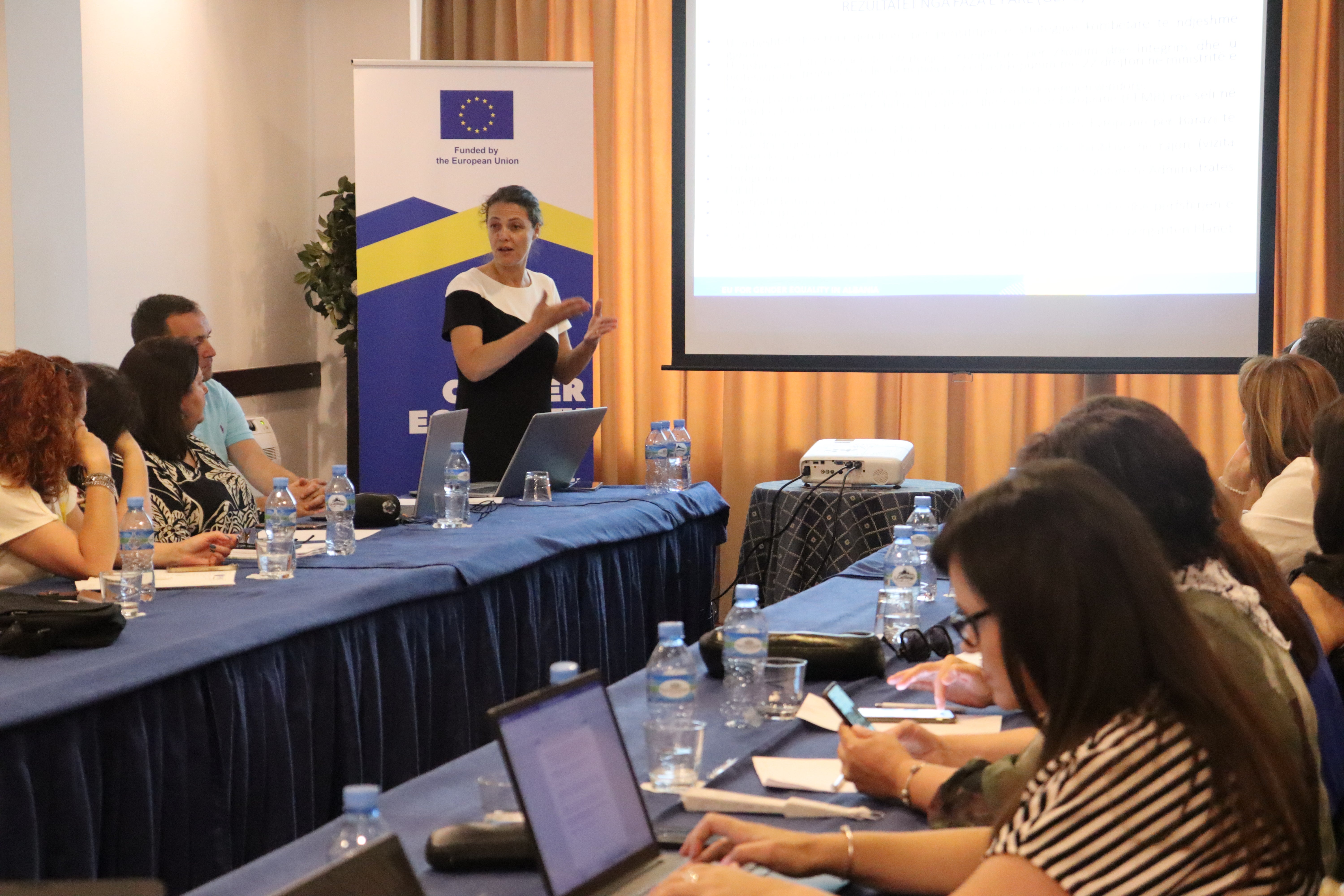Advancing Gender Equality in Governance: Kosovo* and Albania Collaborate for EU Integration through EU-Funded Gender Equality Facility
Date:

UN Women, in partnership with the Ministry of Local Administration Governance and the Agency for Gender Equality within the Office of the Prime Minister of Kosovo, under the European Union-funded “Gender Equality Project”, on June 2024, organized an exchange visit and workshop in Albania to strengthen the knowledge, skills, and capacities of local Gender Equality Officers to effectively engage in gender-responsive governance and EU accession.
The exchange visit and workshop brought together over 20 gender officers from 10 municipalities to exchange experiences, knowledge, skills, and capacities of local gender equality officers to effectively engage in gender-responsive governance and EU accession. Participants discussed standardizing the reporting matrix for local governance, as issued by the Ministry of Local Governance Administration (MLGA) and the Agency for Gender Equality (AGE). Participants also shared experiences and discussed key gender equality issues related to local planning and development.
The event offered a platform for public administration officers from both central and local governance in Kosovo1 to exchange insights with senior public officers from Tirana, Durres, and Elbasan – the three municipalities targeted by Gender Equality Facility (GEF) in Albania. Kosovo participants had the opportunity to learn from their experiences implementing the European Charter for Equality of Women and Men in Local Life, particularly in the context of local governance and EU acceleration.
At the workshop's opening, Albana Lumi, Monitoring and Reporting Officer at AGE, emphasized that "We need to keep enhancing our coordination mechanisms and adopting European gender equality standards. This will support Kosovo's progress towards European integration."
Ejup Kamberaj, Head of the Division for the Advancement of Human Rights, MLGA, highlighted a major success of the first year of GEF implementation, specifically Output 2 which focuses on local government units and gender mainstreaming of policies and plans in alignment with EU gender acquis.
"Gender Equality Action Plans are being drafted in several municipalities in Kosovo, 11 of which have already been approved by the Municipal Assemblies. This advances us on our path towards gender equality in Kosovo's EU integration process. Therefore, we are gradually progressing in enhancing the equality of women and men in local life."
Ganimete Aliu, a gender officer from the Municipality of Obiliq, shared the experience of working closely with UN Women in drafting the Gender Action Plan for the very first time and highlighted the importance of having such a document in place.
"Our municipality, respectively the Local Assembly, approved the GAP 2024-2026 and we are working on its implementation. We are proud to contribute to gender equality between men and women in local life. This makes us a municipality aligned with European standards”.
UN Women in Kosovo started implementing the EU-funded GEF in 2023. So far, under Output 2, supported by UN Women, 11 municipalities – Hani i Elezit, Gjilan, Dragash, Kamenica, Gjakova, Obiliq, Istog, Vitia, Podujeva, Lipjan and Gjilan approved Gender Action Plans and immediately started implementation.
Kosovo entered into a contractual agreement with the EU in 2016 after signing the Stabilization and Association Agreement (SSA). The SAA establishes a contractual relationship with mutual rights and obligations, encompassing a broad range of sectors. This agreement will aid in implementing reforms and provide Kosovo with an opportunity to align more closely with Europe.
Thus, GEF, as an action, aims at strengthening the effective implementation of national and international legal frameworks on gender equality and women’s rights, mainstreaming gender into EU integration and planning processes for pre-accession assistance, and strengthening institutional mechanisms for gender equality in line with the EU standards.
1 For the European Union, this designation is without prejudice to positions on status, and is in line with UNSCR 1244/1999 and the ICJ Opinion on the Kosovo declaration of independence. For UN Women, references to Kosovo shall be understood to be in the context of UN Security Council Resolution 1244 (1999).